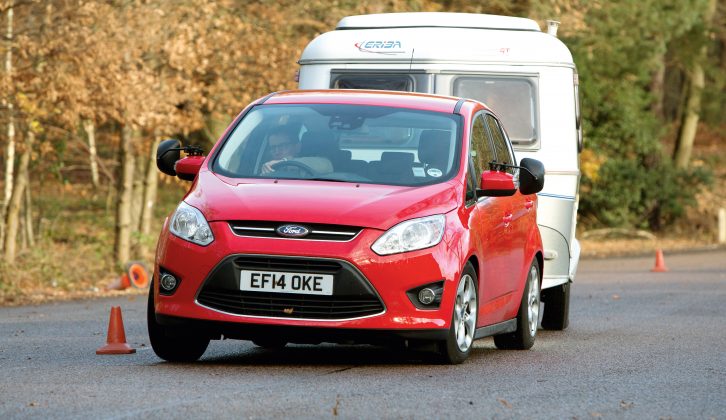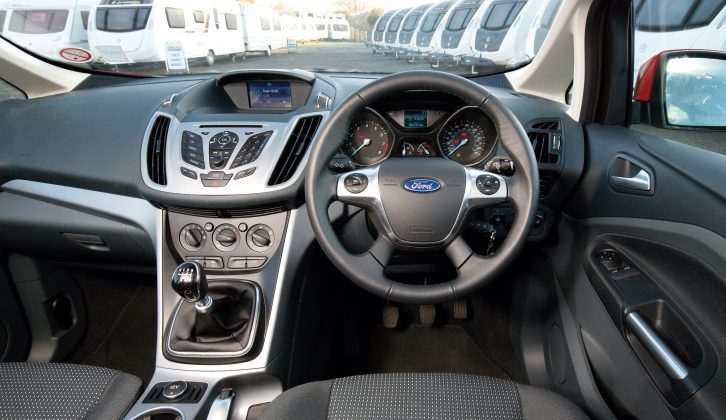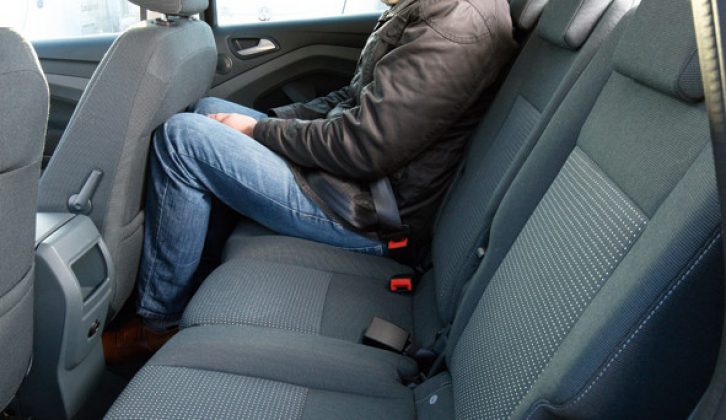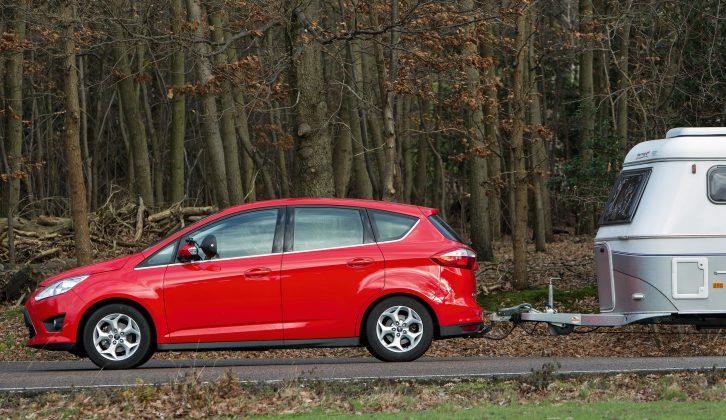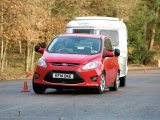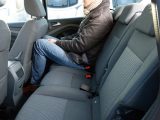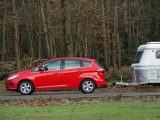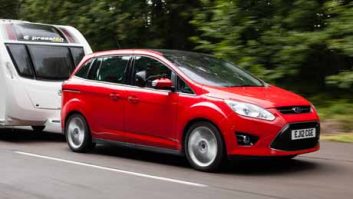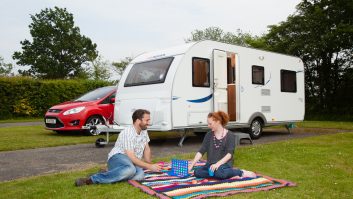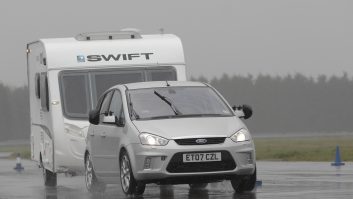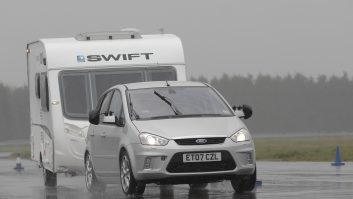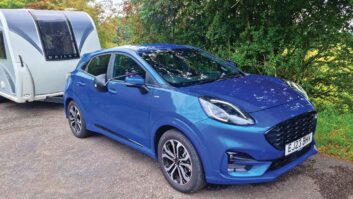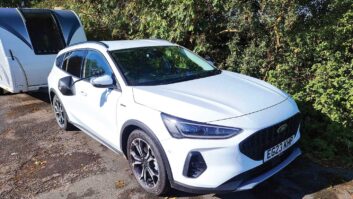Verdict
The Ford C-Max is likeable, but while on the Practical Caravan fleet it has been more popular for everyday driving than for towing. Stability isn’t an issue, but performance is.
Tow a van that is near 85% of the kerbweight and the 1.0-litre engine struggles. If you own a very light tourer, the EcoBoost engine makes more sense. Even then, the 1.6-litre diesel costs just £500 more. We think that’s money worth spending.
Pros
It is a very stable tow car
Cons
Rear legroom is in short supply
It will struggle towing anything but the smallest caravans
The Ford C-Max is a capable five-seat MPV and here at Practical Caravan, we’ve been running the 1.0-litre petrol to see what tow car ability it has. Despite its tiny cubic capacity, the turbocharged engine produces a lot more poke than you’d expect. It’s cheaper to buy than the diesel model, and if the official economy figures are anything to go by the C-Max should prove cheap to run.
But can a small, petrol-powered MPV cut it as a tow car? That’s what we’ll find out in our Ford C-Max review.
It may lack mid-range pull, but it tugs more strongly than many small petrols
Towing
Ford’s EcoBoost engines are proof that you can’t judge an engine by its size. Although it’s just a 1.0-litre, there’s more power (125PS/123bhp) and torque (148lb ft) than you’d expect of such a small petrol unit. But is it up to towing?
We matched the Ford to an Eriba Touring GT with an all-up weight of 900kg. As long as we applied a heavy right foot and worked the gearbox hard, the Ford performed well enough, pulling the caravan from 30-60mph in 12.7 seconds. When left in fifth gear, relying on mid-range torque, the Ford took a slow 16.2 seconds to go from 50-60mph.
During our long-term test with the Ford, we’ve towed heavier caravans than the Eriba. The 1391kg kerbweight gives an 85% match figure of 1182kg, just below the 1200kg legal towing limit. Pulling tourers weighing closer to these figures exposes the EcoBoost’s limitations. Even with the throttle pressed to the floor, the C-Max struggles with hills when towing. It’s not just that it’s slow – you can’t relax when you’re forever changing gears and wringing the engine’s neck.
Despite the towing limit, we think the Ford is much better suited to lightweight tourers, such as the Eriba or a T@B. Even with a very small caravan in tow, it’s never quick, but towing becomes more enjoyable.
While the engine isn’t ideal for a tug, the Ford C-Max is otherwise very capable. At motorway speeds, it feels secure and stable. It remained composed when pushed hard through a slalom course. It gripped well and stayed firmly in charge.
In a hill start on a 1-in-10 slope, the handbrake held the car with no need to pull it on with undue force. However, it took plenty of revs and a careful balance of clutch and throttle to pull to the top of the hill.
We had no trouble with this MPV’s brakes, which stopped car and caravan from 30mph in 10.8m on a damp track.
The C-Max is stable, but this engine is better suited to pulling ultra-light tourers.
Everyday Driving
Freed from the burden of towing, our reservations about the 1.0-litre EcoBoost melt away. It really is a cracking engine for everyday driving.
It may lack the mid-range pull for relaxed towing, but it tugs more strongly than many small petrols. It sounds good, too, with a surprisingly sporty thrum.
Most Fords ride and handle well, and the C-Max is no exception. It’s not quite as much fun as the Focus hatchback, leaning a little more in corners, but for an MPV the C-Max is engaging and entertaining.
This hasn’t been achieved by making the ride harsh. It’s a tad firm at low speeds but the C-Max smooths bumps well. At motorway speeds there’s some wind noise, but otherwise the C-Max is quiet and refined.
Space
The Ford C-Max isn’t the biggest or cleverest of MPVs. Those travelling in front get plenty of room, although some drivers may wish the seat went a little lower. In the back, though, legroom is tight. A Citroën C4 Picasso is roomier, and does a better job of accommodating adults in the second row.
Of the three individual rear seats, the middle one is the narrowest. The seats fold, tumble forward and can be removed completely, although you’d have to store them. There’s a knack to using the seats, and we’d have preferred it if they’d simply folded flat. With all five seats upright, there’s a useful 471-litre boot.
Running Costs
Whatever you do, don’t pay the list price. According to What Car?, discounts of almost £3000 are available if you haggle. That brings the cost below £16,000.
The official combined economy figure of 55.4mpg is superb by petrol standards. Towing the Eriba on A-roads, country roads and motorways we achieved 31.1mpg.
After three years and 36,000 miles on the road, expect the Ford C-Max to be worth around 41% of the list price. The C-Max has a five-star safety rating from Euro NCAP.
Technical Specifications
| Engine Size | 999 cc |
| Kerbweight | 1391 kg |
| 85% KW | 1182 kg |
| Towball Limit | 75 kg |
| Maximum Towing Limit | 1200 kg |
| Power | 123 bhp |
| Torque | 148 lb ft |
| Offical MPG | 55.4 mpg |
| CO₂ | 117 g/km |
